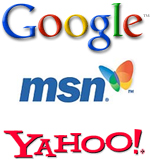Google, Microsoft and Yahoo begin war on features


Yahoo has its competitive set that matches, falls behind or exceeds (such as My Web 2.0) the other two in specific areas. In addition, they are opening up their APIs to varying degrees to become more of a platform for gadget makers and developers. Many of these competing features are in various stages of beta, and some (such as live.com) should be more correctly identified as pre-beta or alpha. Following are a few examples of the battleground:
Google Personalized Homepage and Microsoft's Live.com/Start.com are both AJAX-enabled services that have fairly similar features. They each let you customize the homepage with a set of predefined items or with any other RSS feeds you can find. If you are using Firefox, you may have noticed live.com has a message that says "Firefox support is coming soon. Please be patient" which will leave a bad taste in some mouths. Google Personalized Homepage works well in most browsers and has all the features anybody would need. They are both "Beta", but Google Personalized Homepage has a bit of an edge. My Yahoo has been around for decades it seems, and was the first major instance of a personalized portal. You have to figure that Yahoo will be spreading some AJAX or Flash pixie dust on it to keep up the pace with competitors in terms of improving the user experience, as it has with the new Yahoo Mail and Yahoo Maps.
When comparing Google Talk, MSN Messenger and Yahoo Messenger, it's hard to keep a straight face. Google Talk has four features: The ability to type to people, the ability to speak to people, the ability to add contacts and the ability to log in with different clients. Even deleting contacts from Google Talk is a challenge as they tend to re-appear once deleted. In order to actually get rid of a contact you must also delete it from your GMail. MSN and Yahoo Messengers have been around forever and include all the popular IM features. It is going to be difficult for Google to penetrate this market unless they can successfully "federate" with other IM providers and add more of the features people want, such as integrated VoIP. No doubt GTalk 2 is in the works.
Both Google Local and MSN Virtual Earth do basically the same thing. Since I am from Canada, the very first thing I noticed when trying Virtual Earth was the lack of maps for this country. Even very large cities like Toronto don't have satellite images available. The name "Virtual EARTH" might be a bit optimistic. Microsoft deserves credit, though, in the resolution department as Virtual Earth can zoom quite a bit closer on the cities that are supported. However, unfortunately for Microsoft even novice users fell in love with Google Maps long before Virtual Earth was released and it could be difficult getting them to switch to something different unless it is substantially better.
Blogging has become very popular in a relatively short period of time. Both Microsoft and Google have products that allow people to start their own blogs, MSN Spaces and Blogger. Microsoft has opted to display mandatory advertisements in order to help pay for their MSN Spaces service while Google's "Blogger" has gone the opposite direction by allowing bloggers to add their own AdSense code. In this type of system, both Google and the bloggers are earning money from the advertisers. Yahoo 360 includes basic blog capabilities.
It seems like everybody has their own book scanning project in the works. Google's service "Google Print", already started, has been given a lot of flack over their attempts to digitize every book, copyright or not. So far Google hasn't joined the open source initiative led by the Internet Archive, along with the Smithsonian Institution, HP, Yahoo and Microsoft, to digitize all the world's books. Microsoft also announced a book scanning project called MSN Book Search, working with the British Library to digitize 25 million pages of content. Microsoft and Yahoo will utilize an "opt-in" approach rather than Google's "opt-out" for non-public domain content.
Last October, Google launched Google Desktop, and more recently Google Desktop 2. Microsoft has a similar offering to the original Google Desktop called "MSN Desktop Search". I do not have experience with MSN Desktop Search, so it is unfair to comment on it... however I can say that I have been very impressed so far with Google Desktop 2. The sidebar is a great feature that helps keep track of many things from outside my browser. The MSN solution doesn't have an "out of browser" interface other than the search box that you can dock on your toolbar. Not to be left out, Yahoo also has a competing desktop search tool called Yahoo! Desktop Search.
As a programmer, I often use Google Groups to help troubleshoot problems that I may be experiencing. A typical web search often doesn't link me up with people sharing similar difficulties, and therefore rarely gives me solutions to difficult problems. When looking for technical information I always start on Groups. Microsoft doesn't currently have a similar service aimed at finding group conversations, but it should definitely be something to consider. Yahoo, on the other hand, has their own "Yahoo Groups" which makes an attempt, however the quality of information nowhere matches that of Google Groups.
Google and Yahoo News makes it extremely simple to keep up with current events. These services watch the entire Web for news so I don't have to. For some people, they can be sufficiently happy finding news from a single source such as MSNBC.com or CNN.com, however I like to see the big picture with both sides of the story. Google News, for example, does a good job of showing news from multiple sources, but more importantly it lets me customize the site so it's always full of news that interests me. You can accomplish this by using RSS feeds on all three portals, which is where news and content aggregation are heading.
Microsoft has its own products and services that one day Google may be interested in trying its luck at. Microsoft's Office suite is used, or at least has been used, by almost everybody in business. I am doubtful Google will offer an office product of their own any time soon, however they have already started putting resources into Open Office, which could eventually be a nightmare for Microsoft. What we are likely to see is a lot of activity around gadgets which Google, Microsoft and Yahoo now have as part of their developer platforms.
The browser wars between Internet Explorer and Netscape have been over for a long time, however Mozilla has thrown some kindling on that small fire and has built it back up. Firefox has been gaining market share over the past year, and now with Google offering money to AdSense members for referring people to Firefox, it's sure to grow even stronger. Just as with the Google/Sun alliance looking at Microsoft Office, I can see the makings of a Google/Mozilla alliance aimed at taking on Internet Explorer. It's not so much Google taking on IE. Google wants the broadest distribution possible, and since Mozilla and Sun are willing to bundle and Microsoft isn't -- it's just good business.
As these three companies jockey for position, the next three years will be interesting to watch. Stay tuned as I'll be following up with more in-depth looks at how the features from all three companies stack up in different areas.